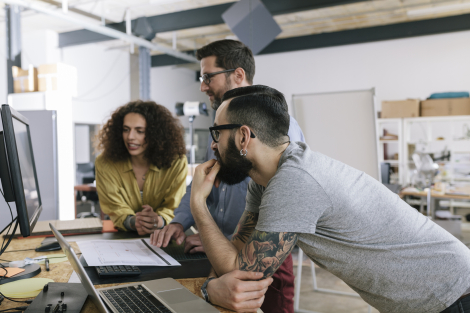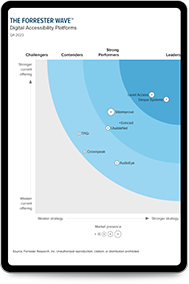eSSENTIAL Accessibility: Proud sponsor of the 2022 National Federation of the Blind (NFB) National Convention
Jun 16, 2022
eSSENTIAL Accessibility and Level Access have merged! Read More
Summary: eSSENTIAL Accessibility (eA) is proud to sponsor the 2022 National Convention of the National Federation of the Blind (NFB). Find out more about the NFB, how the Federation is continuing to fight for digital equality, and why eA is a proud supporter.The National Federation of the Blind (NFB) is the largest and most influential membership organization of blind people in the United States. It is the leading advocate for the inclusion of blind people in all areas of society. Every year, the NFB holds its National Convention, bringing together members and advocates for training, support, networking, and social events, and setting the organization’s priorities for the next 12 months. The 2022 convention takes place in July in New Orleans, and will welcome an expected 3,300 people for six days. eSSENTIAL Accessibility (eA) is proud to sponsor this year’s convention at the platinum level, supporting the NFB’s important work to advance equality and access. We know that the NFB’s critical civil rights advocacy, including its campaigning for improved online accessibility, has far-reaching benefits for users of every ability.
A force for good
The NFB has helped advance disability rights under the Americans with Disabilities Act (ADA) and the Rehabilitation Act of 1973, creating more equitable workplaces, classrooms, and communities for blind Americans. One of the organization’s main legal points of focus is access to information. As we collectively shift to a digital-first society, the NFB continues its advocacy for equal access to digital information, in particular. At eA, ensuring equality of access online is our purpose. And it benefits us all. When digital information and experiences are clearly structured, well designed, and easy to navigate, they are not only more accessible for people with disabilities, but also more enjoyable and usable for everyone. Making a digital experience accessible means it’s free of barriers that would otherwise prevent a blind user, or any user with a disability, from interacting fully with it. The NFB recognized and supported digital accessibility from as early as 1999. It was that year the organization informed AOL of the problems blind people had when using its system and software. This prompted the creation of AOL’s Accessibility Advisory Committee to “advise the company on the accessibility (to people with disabilities) of its products to ensure that they are convenient and easy to use for everyone.” And this is just one of many significant corporate shifts the NFB has influenced over the years.
Leading the charge
Thanks in part to the NFB’s work, Ticketmaster made its website accessible to blind users in 2011, and Monster.com did the same in 2013. The NFB has collaborated with McDonald’s to make its self-service kiosks more accessible. And, because of the NFB, the IRS agreed to provide post-filing tax notices in Braille, large print, or electronic formats. More recently, the organization sent an open letter to education officials in all states regarding the inaccessibility of some student-facing technology during the pandemic-related shift to virtual learning. These high-profile efforts and the NFB’s advocacy continue to raise awareness about the importance of digital accessibility.
Making the web accessible for all
Like the NFB, we believe that everyone deserves equal access to the life-changing opportunities that exist in the digital world. We push ourselves daily to develop the most cutting-edge digital accessibility solutions, equipping organizations with the tools, training, and resources they need to make their websites, mobile apps, software, and digital documents accessible. Our goal is to support and train organizations’ in-house teams to reach compliance benchmarks, then reach beyond them. We also understand the pursuit of equality and accessibility is ongoing, and that’s why we’re proud to sponsor the 2022 NFB National Convention, a gathering of like-minded community members, advocates, and leaders. It’s opportunities like this that will continue to foster sharing, listening, and learning as we collaborate to make the web—and the world—accessible for all.
Subscribe for updates

